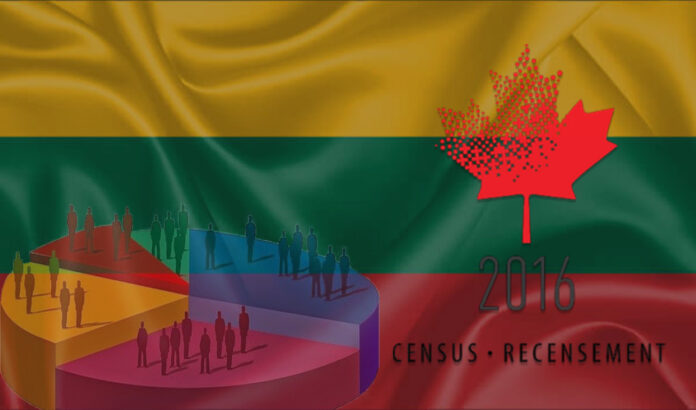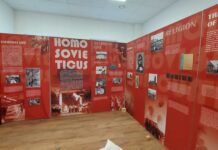
(Source: Statistics Canada, 2016 Census of Population)
What do the numbers tell about Lithuanians living in Canada now, and, are there implications regarding activities of our current Lithuanian organizations?
The recent posting by the Lithuanian-Canadian Museum-Archives on their website: lithuanianheritage.ca highlights a selection of interesting statistics about Lithuanians now living in Canada as found in Canada’s 2016 Census reports. They reflect the responses provided by people who identified themselves as being Lithuanian or of Lithuanian ethnic origin (59,285 in total). They bring us face-to-face with the new realities and pose some challenging questions about Lithuanians in Canada. These new realities challenge our current view of the needs of Lithuanian-Canadians and perhaps call for an adjustment of current activities and programs in Lithuanian communities across Canada.
WHAT DO THE NUMBERS SAY ABOUT US?
IDENTITY: Lithuanians in Canada for the most part are no longer of a single Lithuanian ethnic origin. 20% identify as being of single and only Lithuanian ethnic origin while 80% identify as being of mixed ethnic origin with Lithuanian as one of their ethnic origins. Most of the youth to middle aged populations identify as being Lithuanian-Canadians of mixed ethnic origin. The overwhelmingly high percentage of mixed ethnic origin poses a question to our organizations: what are they doing to support people of mixed ethnic origin who are interested in learning about or maintaining their Lithuanian identity? What do they do to reach out to them and what programs/activities are available to help bolster and maintain their identity as Canadians of Lithuanian heritage but clearly of mixed origins?

LANGUAGE: Assimilation into Canadian culture is taking its toll, especially as evidenced by loss of language. Only 8% report speaking Lithuanian at home. Only 23% are First Generation Lithuanians living in Canada now and over 43% identify as Third Generation Lithuanians. Efforts to maintain the Lithuanian language where it is spoken should be treasured, especially for its uniqueness as an ancient living language, and supported as much as possible. However, the Lithuanian language may be becoming a barrier to engaging Lithuanians of mixed ethnic origin. What materials and activities to foster self-identification as “Lithuanian” and to promote understanding of Lithuanian heritage are available and offered in English and/or French? What is being done to break down barriers to participation in activities of the Lithuanian community in Canada?


LOOKING WESTWARD: Although Ontario, and specifically Toronto, remains as the main hub for Lithuanians living in Canada (60%), British Columbia (Vancouver 12%) is emerging as the next and main hub in Western Canada.

CITIZENSHIP: Lithuanian citizenship is not an issue of major concern to Lithuanians in Canada. Only 3% (1,785) self identified as having Lithuanian citizenship. The focus of activities in the Lithuanian-Canadian community should be on meeting the needs of Lithuanian-Canadians now living and planning to remain living in Canada. Over 43% are already Third Generation living in Canada and most are of mixed ethnic origins. Immigration from Lithuania to Canada is minuscule with a total of 3,045 persons reported as having immigrated between 1980 and 2016. Of this total, the highest number, 1,160 or 38% came between 2001 and 2010 and the next highest 895 or 29% came between 1991 and 2000. The trend is down (580 persons or 19%) between 2011-2016. Is Lithuanian citizenship a priority concern to the 3,045 Lithuanian immigrants who arrived in Canada between 1980 and 2016? Should the push from Lithuania to promote Lithuanian citizenship in Canada also be a priority concern for the leadership of the Lithuanian-Canadian Community (LCC)? The 2016 Census statistics on this issue pose a serious question about priorities…

INFLUENCE: Lithuanians in Canada form a very small proportion of the population (0.2%). To date our influence (especially politically at the National level and amongst local and national media) has been out of proportion to our numbers, due in large part to effective and sustained lobbying and resource allocation to this effort by previous LCC’s leadership. The results of these efforts culminated in active support and lobbying on behalf of Lithuania during the critical years between 1989-1993 when Lithuania undertook to re-establish its independence from the Soviet Union and was seeking much needed international recognition as a sovereign state. The implication of this, going forward, begs the question of the current LCC leadership concerning whether there is the will to continue to have any political or cultural influence? Resources would need to be put into maintaining sustained and deliberate lobbying efforts at the national and local community levels.

Although Lithuanians settled in Canada as early as the 1890’s, Canada-wide formal organization of Lithuanians on a national level into the Lithuanian Canadian Community or LCC is evidenced following the arrival of WWII refugees or displaced persons after 1948 and into the 1950’s. LCC was established to meet the needs of these political refugees. The 2016 Census shows that Canada’s Lithuanians today are different. Do the mission and goals of the major national level organization – the Lithuanian-Canadian Community (LCC) need to be readjusted to meet the new realities of people with Lithuanian roots living in Canada today?
IN SUMMARY:
A few highlights/trends: The 2016 Census brings to light several trends. Use of the Lithuanian language is declining at rapid rates and in some cases has become a barrier to engagement in the Lithuanian-Canadian community, programs and activities. At best, we can expect use of Lithuanian as a second language. There is a significant shift of new organized Lithuanian activity from Quebec and Ontario to Western Canada, particularly in Vancouver, British Columbia that may be emerging as a new hub. A significant number of people self-identifying as being of Lithuanian ethnic origin come from mixed ethnic origin with Lithuanian being only one of multiple origins in the family. Lithuanian-Canadians for the most part are no longer a homogenous Lithuanian group. Lithuanian citizenship is perhaps relevant and of interest to under 3% of those self-identifying as being of Lithuanian origin in Canada. Most of the 59,285 Lithuanian-Canadians seem to be here to stay and outreach from Lithuania to promote a “return to your homeland” may be relevant to less than 3% (1,785 individuals). Hence organized activities need to be aimed at promoting knowledge and expression of heritage for Lithuanians living in Canada: materials about Lithuanian history, customs, folk tales, arts/crafts, literature (especially for toddlers and young parents) in English or French. active representation of Lithuania at local Anglo/French community cultural events; active promotion of heritage summer camp programs/local sports and cultural clubs.
Lithuanian “Saturday Schools” are pivotal for the continued existence of the Lithuanian language as well as for imparting of information about Lithuanian history and culture. The 7 schools operating today in Canada span the country – from Montreal in the East all the way to Vancouver in the West. The efforts taken to establish and maintain these schools is truly praise-worthy. However, perhaps the traditional “Saturday Schools” model with classes taught in Lithuanian only may need to be one of two options. The second option would require a re-orientation to teaching “Lithuanian as a second language” and classes would be taught in English or French. The option of a Lithuanian immersion program would be made available where possible, not be viewed as the “norm” but rather as the exception, A reorientation to maintaining Lithuanian HERITAGE and programing and resources in English/French might enhance opportunities for outreach and engagement of those self identifying as being of Lithuanian ethnic origin.
As the experience of the Lithuanian Heritage Day held in Ottawa, Ontario on the occasion of Canada’s Centennial celebrations amply demonstrated, Lithuanian-Canadians came out in unexpected numbers from various parts of Canada. An event like this clearly confirmed that there is a need for occasions like this to enable people to re-connect with their heritage. Consideration should be given to re-establishment of annual or bi-annual Canadian Lithuanian Heritage Days as an opportunity to express that heritage in Canada-wide or even regional (Western Canada and Eastern Canada-wide) large-scale events that encompass arts, culture and sports events, etc. (Similar to the Australian-Lithuanian Community Days organized every two years, hosted on a rotating basis in cities with significant populations of Lithuanians. These days are all encompassing events featuring a cultural concert of songs and folk dances, Lithuanian sports teams competitions, trade/craft shows and national bi-annual meetings of various Australian-Lithuanian organizations. It is a tradition that is alive and well to this day.)
(Based on graphics using data about Lithuanian-Canadians as reported in the Canada Census 2016, prepared by the Lithuanian-Canadian Museum-Archives and published on the lithuanianheritage.ca website)
Review of Statistics Canada’s Census was prepared by Gabija Petrauskienė





























